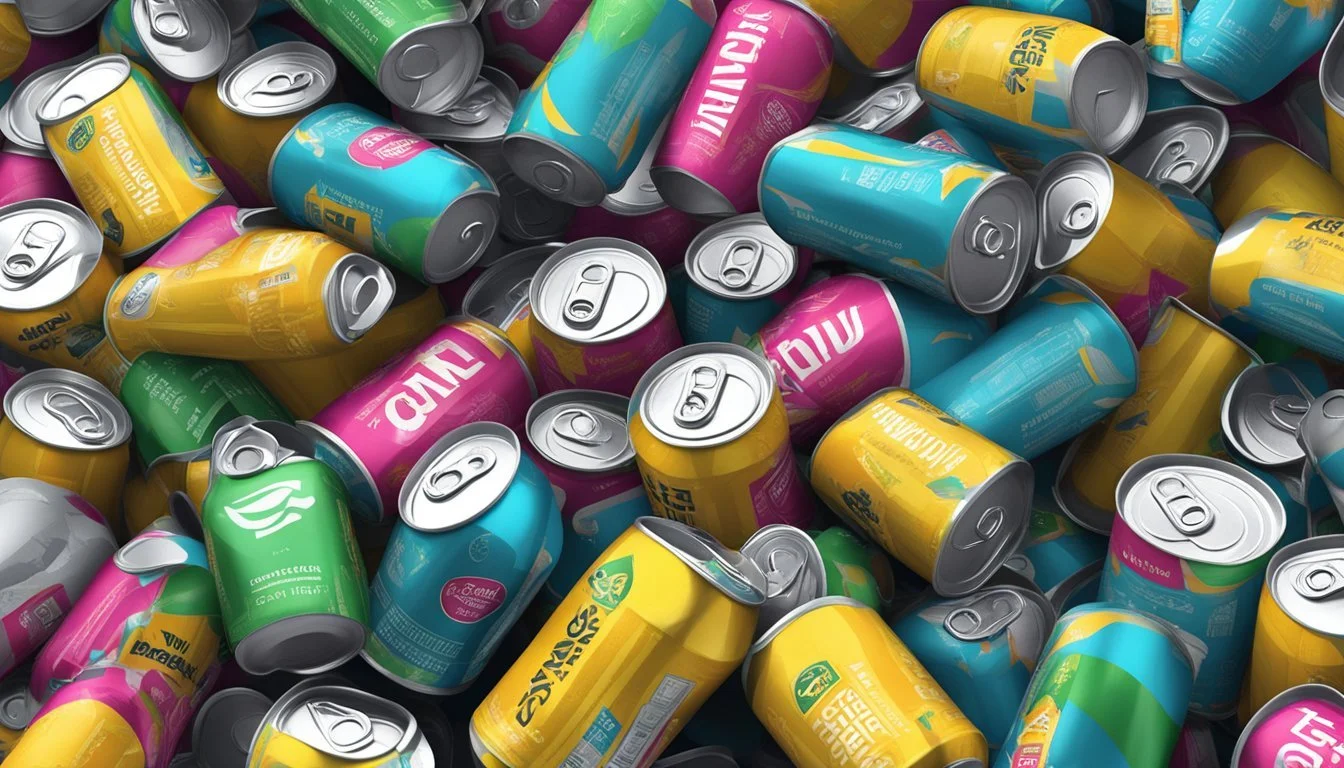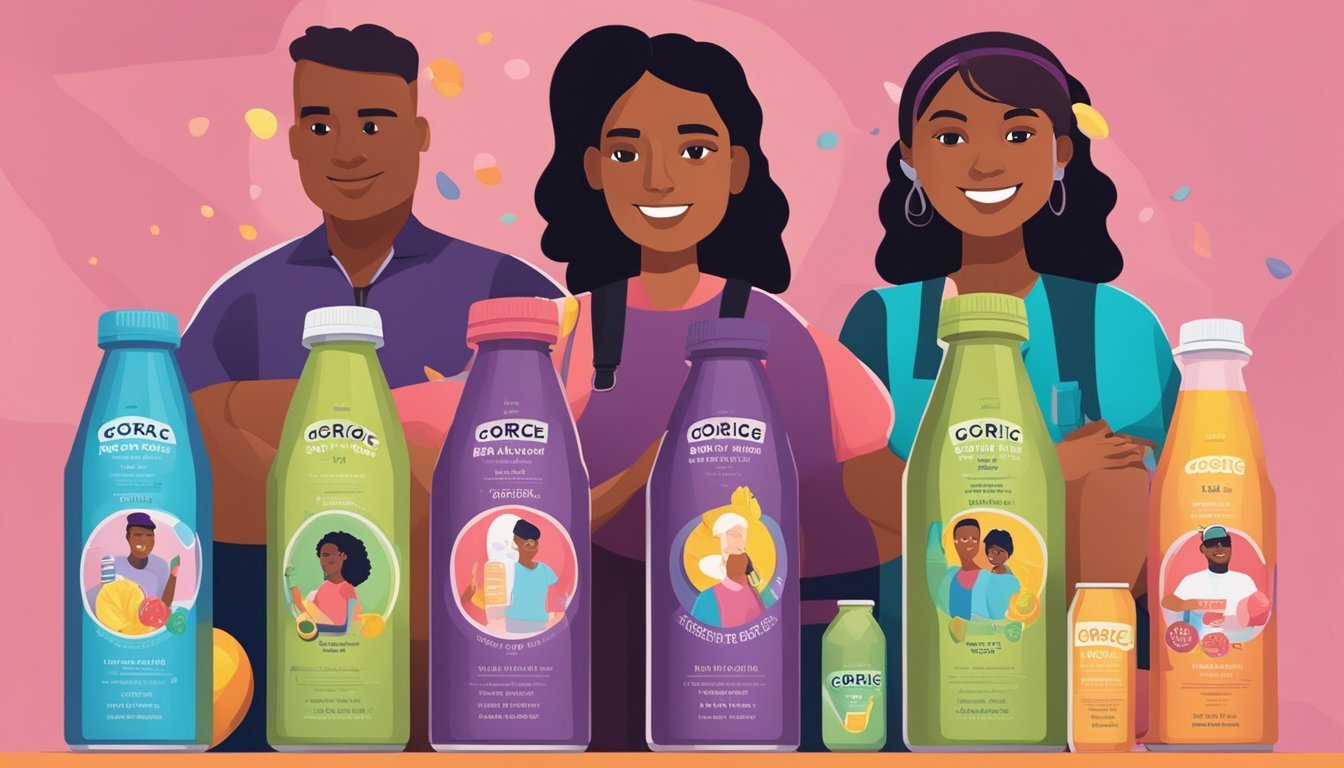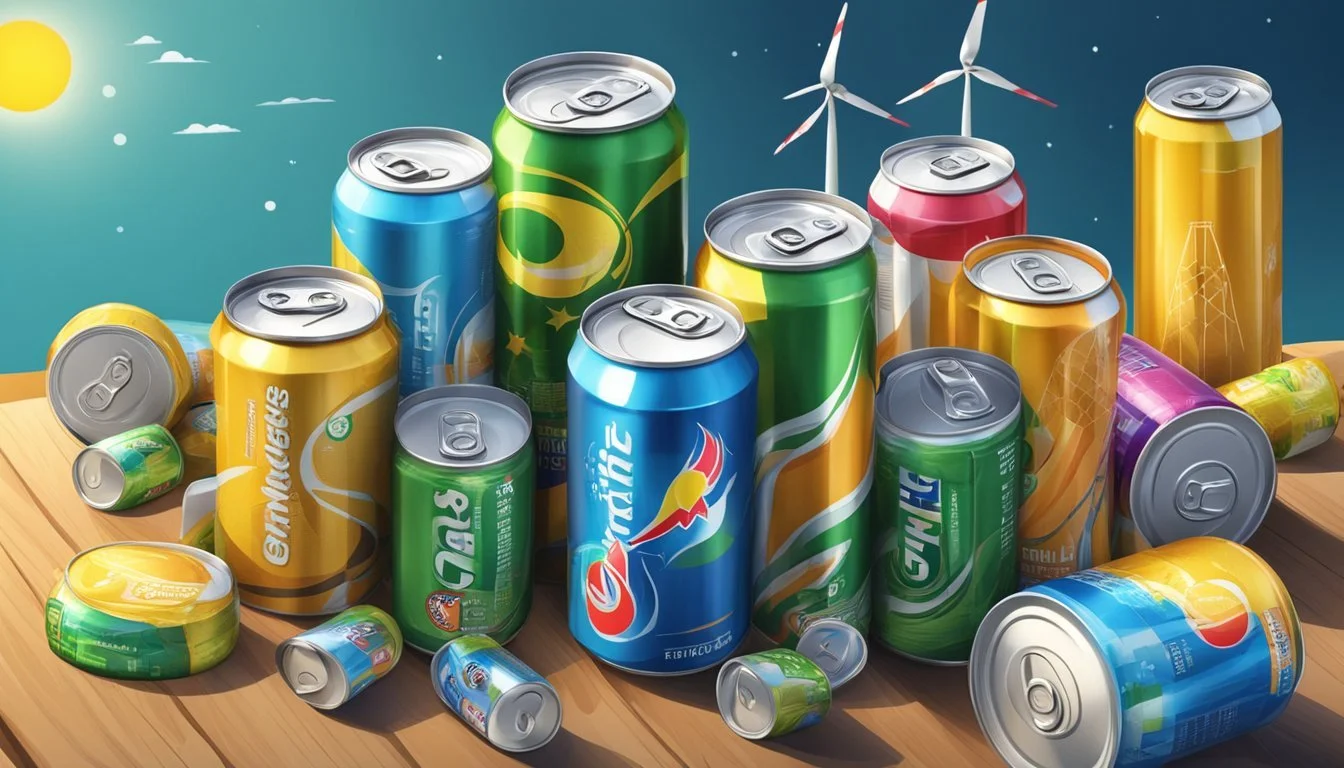How Many Servings of Gorgie Energy Drink Is Too Much
Expert Guidelines
Navigating the world of energy drinks can be tricky, especially with options like Gorgie Energy Drink on the market. Gorgie, a sparkling, sugar-free beverage, boasts benefits from green tea, biotin, B vitamins, and L-Theanine. While it offers many health-friendly ingredients, it's crucial to know how many servings are safe to consume.
Caffeine intake is a key consideration. The FDA suggests that up to 400 mg of caffeine per day is safe for most adults, but caffeine content in energy drinks can vary. Gorgie Energy Drink contains about 80 mg-150 mg per serving, similar to a cup of coffee. Consuming three servings could potentially put one near or slightly above the recommended limit, depending on the exact caffeine content per can.
Staying within safe consumption levels is essential for avoiding potential health risks. Overconsumption of energy drinks may lead to side effects such as jitteriness, insomnia, or more severe issues like heart palpitations. Being aware of the caffeine content in Gorgie can help maintain balance and enjoy the benefits without negative effects.
Understanding Energy Drinks
Energy drinks have become popular for their ability to boost energy and alertness. They contain various ingredients like caffeine, taurine, and vitamins, which each play specific roles in enhancing cognitive and physical performance.
Key Ingredients and Their Effects
Energy drinks like GORGIE often boast a combination of essential ingredients designed to boost energy. These include caffeine, B vitamins, and green tea extracts.
Caffeine is a primary stimulant found in coffee and tea, known to increase alertness. In energy drinks, caffeine content ranges from 50 mg to over 300 mg per serving.
Taurine, an amino acid, supports neurological development and may improve athletic performance. Guarana, another stimulant, contains caffeine and enhances the stimulant effects.
B vitamins, such as B6 and B12, aid in energy metabolism. Green tea provides a milder stimulant effect and contains antioxidants. Herbal extracts like ginseng are also common, believed to reduce fatigue and enhance mental sharpness. GORGIE's drink, for instance, includes biotin and L-theanine, which can promote relaxation without drowsiness.
Comparison with Other Stimulants
When compared to other stimulants, the ingredients in energy drinks offer a unique combination of effects.
Coffee, a popular stimulant, primarily delivers caffeine but lacks the additional vitamins and amino acids. Soft drinks may contain caffeine too, but they often have high sugar content without the benefits of vitamins.
Pre-workout supplements might include similar ingredients like caffeine and taurine but are formulated specifically for athletic performance.
Energy drinks balance caffeine with other ingredients to create a broader range of benefits. For instance, green tea in energy drinks provides a smoother energy boost compared to the jitteriness that can come from coffee's higher caffeine content.
In summary, energy drinks like GORGIE offer more than just an energy boost due to their diverse mix of ingredients, making them distinct from other caffeine sources.
Health Implications of Energy Drinks
Energy drinks offer both short-term benefits and long-term risks, impacting physical and mental health.
Short-Term Benefits and Risks
Energy drinks commonly contain caffeine and other stimulants that provide a quick boost in energy, alertness, and focus. Green tea extract, B Vitamins, and L-Theanine are often included to enhance these effects.
Individuals might experience a temporary improvement in physical performance and mental clarity. This makes energy drinks popular among students, athletes, and busy professionals.
However, excessive consumption can lead to increased heart rate and blood pressure, jitteriness, and dehydration. Even individuals without underlying health conditions may face negative effects like insomnia, headaches, and anxiety after consuming multiple servings.
Long-Term Health Effects
Long-term consumption of energy drinks has been linked to several serious health issues. Regular intake can contribute to heart disease, obesity, and diabetes due to high caffeine and sugar content, despite some brands offering low or zero sugar options.
Mental health can also be affected, as chronic caffeine intake may lead to increased anxiety and mood disorders. Additionally, energy drinks can disrupt normal sleep patterns, further exacerbating mental health problems.
Prolonged use may lead to dependence on stimulants, making it difficult for individuals to maintain energy levels without regular consumption. This can create a cycle of increased usage and greater health risks.
Specific Risks for Different Demographics
Different age groups and health conditions face unique risks when consuming energy drinks like Gorgie. It is crucial to understand these risks to make informed decisions.
Pediatric and Adolescent Considerations
For children and adolescents, the American Academy of Pediatrics strongly advises against the consumption of energy drinks. High caffeine content can lead to adverse effects such as increased heart rate, high blood pressure, and anxiety.
Children are more susceptible to these effects due to their lower body weight and developing nervous systems. Additionally, excessive caffeine can disrupt sleep patterns, leading to poor academic performance and behavioral issues.
Implications for Pregnant and Nursing Women
Pregnant and nursing women should also be cautious. Consuming high levels of caffeine is linked to potential complications such as low birth weight and preterm birth. The American College of Obstetricians and Gynecologists suggests limiting caffeine intake to 200 mg per day, roughly the amount found in one slim can of Gorgie.
Nursing mothers should be aware that caffeine can pass through breast milk, potentially affecting the infant by causing irritability or sleep disturbances.
Effects on Adults with Pre-existing Conditions
Adults with pre-existing conditions such as high blood pressure or heart conditions should monitor their caffeine intake carefully. Caffeine can exacerbate these conditions by increasing heart rate and causing blood vessel constriction.
It is advisable for individuals with these health issues to consult a healthcare provider before consuming energy drinks. The extra vitamins and ingredients may also interact with medications they are taking.
Recommended Consumption
When considering how many servings of GORGIE energy drink are appropriate, it is crucial to focus on moderation and understanding the drink's serving sizes.
Daily Limits and Moderation
The FDA recommends that a safe daily caffeine intake is up to 400 mg for most adults. Since one serving of GORGIE energy drink contains a certain amount of caffeine, calculating the total daily consumption is key.
Over-consuming caffeine can lead to various health issues such as increased heart rate, anxiety, and insomnia. The American Heart Association suggests moderation in all things, especially beverages with ingredients like Biotin, B Vitamins, and L-Theanine, which have their own effects on the body.
Understanding Serving Sizes
A typical serving of GORGIE energy drink is one can, which usually contains a specific amount of caffeine and other active substances like green tea extracts and vitamins. Knowing the caffeine content per serving helps in maintaining a balanced intake.
For example, if a can of GORGIE has 80 mg of caffeine, drinking more than five cans could exceed the daily recommended limit. Keeping track of servings ensures that consumers stay within safe consumption levels while enjoying the benefits of the drink.
Potential Interactions and Complications
When consuming energy drinks like GORGIE, it is crucial to understand how they might interact with other substances and the potential health complications.
Energy Drinks and Alcohol
Combining energy drinks with alcohol can mask the depressant effects of alcohol, leading individuals to feel less impaired than they actually are. This can result in increased risk-taking behaviors and potentially dangerous situations.
Studies have shown that caffeine in energy drinks can reduce the perception of intoxication without reducing alcohol's impairment effects. This increases the risk of alcohol poisoning because users might drink more than they realize. The stimulant effects of caffeine may also aggravate the nervous system, leading to issues such as increased heart rate and insomnia.
Interaction with Medications and Other Substances
Energy drinks can have significant interactions with certain prescription medications and other substances. For example, the high caffeine content can interfere with medications for conditions like anxiety and depression, worsening symptoms.
Energy drinks may also interact negatively with medications that affect the nervous system, such as stimulants or depressants. Those with cardiovascular conditions should avoid energy drinks or consult a medical professional before consumption due to the potential for excessive consumption to cause heart problems.
Some ingredients in energy drinks, such as L-Theanine and B Vitamins, might also interact with other dietary supplements, which can lead to imbalances or side effects. Always check labels and consult with a healthcare provider to understand the risks.
Recognizing and Managing Side Effects
Consuming too many servings of GORGIE energy drink can lead to a range of side effects. It is crucial to recognize these signs early and manage any adverse reactions effectively to maintain health and well-being.
Identifying Signs of Overconsumption
Overconsumption of GORGIE energy drink can manifest through several symptoms. Common indicators include jitteriness, anxiety, and an elevated heart rate.
Individuals might also experience headaches, a sign that caffeine levels are too high. Insomnia is another frequent issue, as excessive caffeine disrupts sleep patterns. Mild nausea or gastrointestinal discomfort can also occur.
Dehydration is a risk, especially if the beverage is not consumed with adequate water. When these signs appear, it signals the need to reduce intake or pause consumption altogether.
Dealing with Adverse Reactions
If adverse reactions occur, immediate steps should be taken. Hydration is imperative; drinking water helps to counteract the dehydrating effects. If jitteriness or anxiety is present, finding a calm environment and practicing deep breathing can mitigate symptoms.
For insomnia, limiting caffeine intake several hours before bedtime is recommended. Persistent headaches might necessitate a break from all caffeinated beverages. In cases of nausea, consuming small, bland meals can provide relief.
Should symptoms persist or worsen, it is advisable to seek medical advice. Understanding and managing these side effects ensure a safer and more beneficial experience with GORGIE energy drink.
Alternative Sources of Energy
Exploring alternative sources of energy can provide the necessary boost without relying on traditional energy drinks. These options often contain beneficial ingredients like natural flavors, sweeteners, and lower levels of caffeine.
Healthier Energy Boosting Options
Coffee: A common choice, offering a rich source of caffeine without added sugars or artificial ingredients. It's effective in boosting alertness and concentration.
Green Tea: Contains natural caffeine and L-Theanine, promoting calmness while enhancing focus. The antioxidants provide additional health benefits.
Water: Staying hydrated is critical for maintaining energy levels. Dehydration can lead to fatigue, so consistent water intake is essential.
Sports Drinks: Targeted at replenishing electrolytes lost during physical activity. Look for versions with natural sweeteners and no artificial flavors.
Natural Ingredient Alternatives
Smoothies: A blend of fruits, vegetables, and natural ingredients. Adding sources of protein or healthy fats can prolong energy release.
Nuts and Seeds: Rich in proteins and healthy fats. They offer a quick energy boost without spikes in blood sugar levels.
Herbal Teas: Varieties like peppermint, ginseng, and ginger can provide mild energy boosts with additional wellness benefits.
Dark Chocolate: Contains natural stimulants like Theobromine. Opt for versions with a high cocoa content and minimal added sugars.
Consumer Guidance and Safety Regulations
Consumers should be aware of safety standards and guidelines established by health organizations and learn how to read nutrition labels effectively to avoid excessive intake of GORGIE energy drinks.
Standards and Guidelines by Health Organizations
The Food and Drug Administration (FDA) provides guidelines on caffeine safety, recommending no more than 400 milligrams of caffeine per day for most adults. GORGIE energy drinks derive their caffeine from green tea, which is known for its beneficial compounds but should still be consumed in moderation.
Health organizations also caution against excessive consumption of added sugars and artificial sweeteners. GORGIE is promoted as having 0 sugar, which aligns with recommendations to limit added sugar intake. However, consumers should verify this claim and any use of artificial sweeteners to avoid potential health risks.
Key Points:
Caffeine: Up to 400 mg/day advised by FDA.
Sugar: Monitor added sugar and artificial sweetener content.
Natural Ingredients: Priority on ingredients like green tea and vitamins.
Reading and Understanding Nutrition Labels
Properly reading and understanding nutrition labels helps consumers make informed decisions about GORGIE energy drink consumption. Start by checking the serving size to understand how much caffeine, vitamins, and other nutrients are in each can. For example, if a can contains 50 milligrams of caffeine, multiple servings could quickly exceed safe limits.
Label Components:
Serving Size: Determine how much you're actually consuming.
Caffeine Content: Important for staying within daily limits.
Ingredients List: Check for any artificial sweeteners or preservatives.
Nutritional Information: Look for vitamins like Biotin and B Vitamins mentioned.
Consumers can use the label to compare GORGIE with other beverages, ensuring they choose options that fit within health guidelines. This proactive approach supports safe and beneficial consumption habits.
Market Dynamics and Consumer Behaviors
The energy drink market is highly competitive, driven by evolving consumer preferences and aggressive branding by leading manufacturers.
Popularity and Sales Trends
Energy drink sales have shown considerable growth over the years, with leading brands like Red Bull and Monster dominating the market. They account for a significant share, alongside other popular names like Nos, Rockstar, Bang, and Celsius. Sales data indicates that the demand is continuously rising, influenced by new product variations and flavors.
Manufacturers have responded by introducing low-sugar and natural ingredient options. Post-pandemic, there has been increased interest in health-conscious beverages. This shift is visible in the growing market share of brands such as Celsius, known for its fitness-oriented marketing.
Public Perception and Branding
Public perception of energy drinks has evolved, with mixed opinions on health impacts. Branding plays a critical role in shaping consumer behavior. Red Bull and Monster exemplify successful branding strategies through high-profile sponsorships and advertising, which have reinforced their market dominance.
Health-conscious consumers prefer brands that promote natural ingredients and transparent labeling. Celsius, for instance, capitalizes on these preferences by emphasizing its health benefits. This has allowed it to carve out a niche within the market.
Effective branding tactics such as celebrity endorsements and sports sponsorships continue to drive market dynamics, making branding a pivotal aspect of consumer decision-making.








